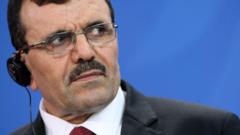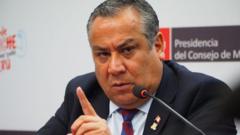The recent sentencing of ex-Prime Minister Ali Laarayedh to 34 years in prison on terrorism charges raises alarms about the erosion of democratic norms in Tunisia, where critics of the current regime face increasingly stringent reprisals.
Ex-Prime Minister Ali Laarayedh Sentenced to 34 Years on Terrorism Charges in Tunisia

Ex-Prime Minister Ali Laarayedh Sentenced to 34 Years on Terrorism Charges in Tunisia
A court ruling against the former official raises concerns over political motivations and authoritarianism.
A Tunisian court has imposed a 34-year prison sentence on former Prime Minister Ali Laarayedh amid terrorism charges, igniting widespread criticism about the fairness of the legal proceedings against him. Laarayedh, who served as prime minister a decade ago, is a prominent figure in Tunisian politics, being a critic of current President Kais Saied and a leader in the Ennahda party, the largest political entity in the parliament advocating for Islamist principles.
Laarayedh's charges stem from accusations of establishing a terrorist network and facilitating the travel of young Tunisians to conflict zones in Iraq and Syria to join extremist groups. In a poignant letter addressed to the prosecutor, he proclaimed, "I am not a criminal... I am a victim in this case." His claims of innocence contrast sharply with the actions of the current regime, which many observers argue are politically motivated.
The recent jailing of Laarayedh represents a troubling trend in Tunisia, where over 40 of Saied's critics—including diplomats, legal professionals, and journalists—have faced imprisonment in a government crackdown perceived as targeting dissent. Rights organizations have condemned the proceedings, critiquing Saied’s consolidation of power and his authoritarian approach, especially following the dissolution of parliament in 2021 and his enactment of governance by decree.
Observers note that Laarayedh’s arrest and trial seem to both silence a key opposition leader and send a message to other potential dissenters against the regime. Human Rights Watch has characterized the situation as another instance of Saied’s government labelling political opponents as "terrorists" in an effort to undermining their legitimacy.
Laarayedh’s political party, Ennahada, briefly ruled Tunisia following the 2011 Arab Spring uprising, which sought to address rampant corruption and power imbalances. However, many citizens now express that the country’s earlier democratic strides are increasingly imperiled under Saied’s heavy-handed rule.
Despite domestic and international criticism, President Saied has remained firm in his stance, responding that he is combating "traitors" and facing "blatant foreign interference." As Tunisia grapples with its political reality, the future of its democratic aspirations hangs in the balance, contested by a regime accused of eroding the very foundations of civil liberties and political dissent.



















